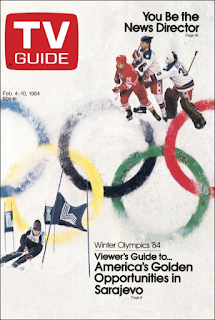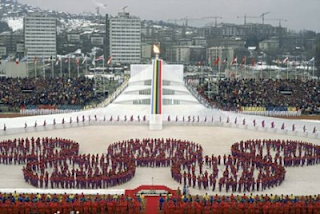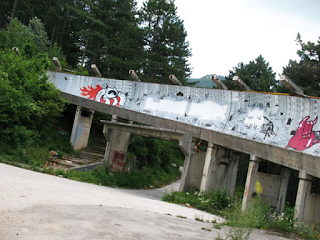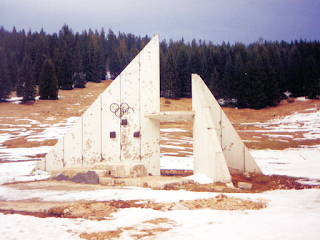This week in TV Guide: February 4, 1984
Look familiar? It should; as I mentioned last week, we're in a brief hiatus from new TV Guide reviews, which means a blast from the past. This week, we go back six years to a rare look at an issue from the 1980s.
 We've skipped ahead twenty years from last week's issue, to another Olympics preview—the XIV Winter Olympiad, in perhaps the most tragic city ever to host the games.
We've skipped ahead twenty years from last week's issue, to another Olympics preview—the XIV Winter Olympiad, in perhaps the most tragic city ever to host the games.
The '84 Games were the first Winter Olympics to be held in a Communist country, Yugoslavia. At the time Sarajevo was known primarily as the site of the assassination of Archduke Franz Ferdinand of Austria, the event that triggered World War I. Fresh off of its triumphant coverage of the Lake Placid games, ABC presented what was then a record 63½ hours of coverage for the 14 days*. As was the case in 1980, we see the coverage dominating ABC's prime-time schedule, covering anywhere from 2 to 4½ hours each night, with a 30 minute review after the late local news. It's interesting that ABC feels the need to point out that most of the coverage will be on a tape-delay basis, viewers having been spoiled by all the live coverage from Lake Placid (not including the US-USSR hockey game, of course).
*This was the last Winter Olympics to start in mid-week; in 1988 the Calgary games would begin on Saturday, and since then the start has been moved to Friday in order to accommodate a prime-time opening. ABC's coverage actually started the night before, on Tuesday, with the first round of the hockey tournament.
 The Opening Ceremonies, Kosevo StadiumQuestions abounded: would the hockey team be able to repeat its memorable gold medal-winning 1980 run? (Not hardly; they managed to defeat Poland 7-4 in the seventh-place game.) Would the speed skaters duplicate the amazing Eric Heiden's five gold medals? (Not quite—no medals at all, actually.) Would the Mahre brothers come through in the alpine events? (Yes; Phil won gold and Steve silver in the slalom.) And would there be another American star born in Sarajevo? (I'd nominate Bill Johnson, the downhill gold medalist.)
The Opening Ceremonies, Kosevo StadiumQuestions abounded: would the hockey team be able to repeat its memorable gold medal-winning 1980 run? (Not hardly; they managed to defeat Poland 7-4 in the seventh-place game.) Would the speed skaters duplicate the amazing Eric Heiden's five gold medals? (Not quite—no medals at all, actually.) Would the Mahre brothers come through in the alpine events? (Yes; Phil won gold and Steve silver in the slalom.) And would there be another American star born in Sarajevo? (I'd nominate Bill Johnson, the downhill gold medalist.)
It was a great show; everyone agreed that Wednesday afternoon's Opening Ceremonies were charming, capturing the spirit and culture of Sarajevo. As the flag was passed to Calgary for 1988, everyone agreed that the Canadians would have a hard act to follow.
 The bobsled run became a mortar launching padFast forward ten years to 1994. Kosevo Stadium, the site of the Opening Ceremonies, is riddled with holes from howitzer shells and snipers' bullets, and a graveyard lies not far away. The bobsled run has been turned into an artillery position from which rebel forces can shell the city. The men’s downhill ski area is now a UN buffer, and the steps on the medal presentation stand are being used for executions. Zetra Stadium, home of the figure skating, was blown up a few years ago, and now serves as a base for French UN troops. Maps that used to direct tourists to various Olympic venues are now used by journalists as military battle maps.
The bobsled run became a mortar launching padFast forward ten years to 1994. Kosevo Stadium, the site of the Opening Ceremonies, is riddled with holes from howitzer shells and snipers' bullets, and a graveyard lies not far away. The bobsled run has been turned into an artillery position from which rebel forces can shell the city. The men’s downhill ski area is now a UN buffer, and the steps on the medal presentation stand are being used for executions. Zetra Stadium, home of the figure skating, was blown up a few years ago, and now serves as a base for French UN troops. Maps that used to direct tourists to various Olympic venues are now used by journalists as military battle maps.
The civil war that gutted Yugoslavia in the '90s killed nearly 150,000 people, and resulted in hundreds of thousands of refugees and the breakup of the country itself.* The siege of Sarajevo, which lasted nearly four years, killed over 11,000 people, including 1,500 children. Reminders of the 1984 games are few and far between, even as the city (now the capital of Boznia and Herzegovina) is well on the way to rebuilding. Some civic leaders even speak of the hope that they might once again host the Olympics. That, indeed, would be a miracle.
 The stand for medal ceremonies: an execution site*Making this the only Olympic Games to be held in a country that no longer exists, if one discounts the 1972 Summer Olympics in Munich, West Germany. I don't think the reunification of a country is quite the same as the dissolution of one, myself.
The stand for medal ceremonies: an execution site*Making this the only Olympic Games to be held in a country that no longer exists, if one discounts the 1972 Summer Olympics in Munich, West Germany. I don't think the reunification of a country is quite the same as the dissolution of one, myself.
One of the most memorable quotes about Sarajevo came in a Sports Illustrated article written during the height of the war . Skier Jure Franko, who carried Yugoslavia's flag in the Opening Ceremonies and went on to win silver in the giant slalom, speaks bitterly about Sarajevo ten years later:
It puts the "warfare" of modern athletic competition in perspective a bit, don't you think?
 We've skipped ahead twenty years from last week's issue, to another Olympics preview—the XIV Winter Olympiad, in perhaps the most tragic city ever to host the games.
We've skipped ahead twenty years from last week's issue, to another Olympics preview—the XIV Winter Olympiad, in perhaps the most tragic city ever to host the games.The '84 Games were the first Winter Olympics to be held in a Communist country, Yugoslavia. At the time Sarajevo was known primarily as the site of the assassination of Archduke Franz Ferdinand of Austria, the event that triggered World War I. Fresh off of its triumphant coverage of the Lake Placid games, ABC presented what was then a record 63½ hours of coverage for the 14 days*. As was the case in 1980, we see the coverage dominating ABC's prime-time schedule, covering anywhere from 2 to 4½ hours each night, with a 30 minute review after the late local news. It's interesting that ABC feels the need to point out that most of the coverage will be on a tape-delay basis, viewers having been spoiled by all the live coverage from Lake Placid (not including the US-USSR hockey game, of course).
*This was the last Winter Olympics to start in mid-week; in 1988 the Calgary games would begin on Saturday, and since then the start has been moved to Friday in order to accommodate a prime-time opening. ABC's coverage actually started the night before, on Tuesday, with the first round of the hockey tournament.
 The Opening Ceremonies, Kosevo StadiumQuestions abounded: would the hockey team be able to repeat its memorable gold medal-winning 1980 run? (Not hardly; they managed to defeat Poland 7-4 in the seventh-place game.) Would the speed skaters duplicate the amazing Eric Heiden's five gold medals? (Not quite—no medals at all, actually.) Would the Mahre brothers come through in the alpine events? (Yes; Phil won gold and Steve silver in the slalom.) And would there be another American star born in Sarajevo? (I'd nominate Bill Johnson, the downhill gold medalist.)
The Opening Ceremonies, Kosevo StadiumQuestions abounded: would the hockey team be able to repeat its memorable gold medal-winning 1980 run? (Not hardly; they managed to defeat Poland 7-4 in the seventh-place game.) Would the speed skaters duplicate the amazing Eric Heiden's five gold medals? (Not quite—no medals at all, actually.) Would the Mahre brothers come through in the alpine events? (Yes; Phil won gold and Steve silver in the slalom.) And would there be another American star born in Sarajevo? (I'd nominate Bill Johnson, the downhill gold medalist.)It was a great show; everyone agreed that Wednesday afternoon's Opening Ceremonies were charming, capturing the spirit and culture of Sarajevo. As the flag was passed to Calgary for 1988, everyone agreed that the Canadians would have a hard act to follow.
 The bobsled run became a mortar launching padFast forward ten years to 1994. Kosevo Stadium, the site of the Opening Ceremonies, is riddled with holes from howitzer shells and snipers' bullets, and a graveyard lies not far away. The bobsled run has been turned into an artillery position from which rebel forces can shell the city. The men’s downhill ski area is now a UN buffer, and the steps on the medal presentation stand are being used for executions. Zetra Stadium, home of the figure skating, was blown up a few years ago, and now serves as a base for French UN troops. Maps that used to direct tourists to various Olympic venues are now used by journalists as military battle maps.
The bobsled run became a mortar launching padFast forward ten years to 1994. Kosevo Stadium, the site of the Opening Ceremonies, is riddled with holes from howitzer shells and snipers' bullets, and a graveyard lies not far away. The bobsled run has been turned into an artillery position from which rebel forces can shell the city. The men’s downhill ski area is now a UN buffer, and the steps on the medal presentation stand are being used for executions. Zetra Stadium, home of the figure skating, was blown up a few years ago, and now serves as a base for French UN troops. Maps that used to direct tourists to various Olympic venues are now used by journalists as military battle maps.The civil war that gutted Yugoslavia in the '90s killed nearly 150,000 people, and resulted in hundreds of thousands of refugees and the breakup of the country itself.* The siege of Sarajevo, which lasted nearly four years, killed over 11,000 people, including 1,500 children. Reminders of the 1984 games are few and far between, even as the city (now the capital of Boznia and Herzegovina) is well on the way to rebuilding. Some civic leaders even speak of the hope that they might once again host the Olympics. That, indeed, would be a miracle.
 The stand for medal ceremonies: an execution site*Making this the only Olympic Games to be held in a country that no longer exists, if one discounts the 1972 Summer Olympics in Munich, West Germany. I don't think the reunification of a country is quite the same as the dissolution of one, myself.
The stand for medal ceremonies: an execution site*Making this the only Olympic Games to be held in a country that no longer exists, if one discounts the 1972 Summer Olympics in Munich, West Germany. I don't think the reunification of a country is quite the same as the dissolution of one, myself.One of the most memorable quotes about Sarajevo came in a Sports Illustrated article written during the height of the war . Skier Jure Franko, who carried Yugoslavia's flag in the Opening Ceremonies and went on to win silver in the giant slalom, speaks bitterly about Sarajevo ten years later:
"As many positive feelings as I had then, that's how many negative feelings I have now. For me to know that the people who surrounded me with such love, the same people who surrounded all the athletes with such love, who wrapped the entire Olympic Village in all possible warm feelings...to know that they are now trying to kill each other is basically unthinkable. Eighty, maybe 90 percent of the people dying now in Sarajevo have absolutely nothing to do with the war. They die when they go to get bread or a bucket of water. They are innocent."
It puts the "warfare" of modern athletic competition in perspective a bit, don't you think?
Published on February 02, 2019 05:00
No comments have been added yet.
It's About TV!
Insightful commentary on how classic TV shows mirrored and influenced American society, tracing the impact of iconic series on national identity, cultural change, and the challenges we face today.
- Mitchell Hadley's profile
- 5 followers



